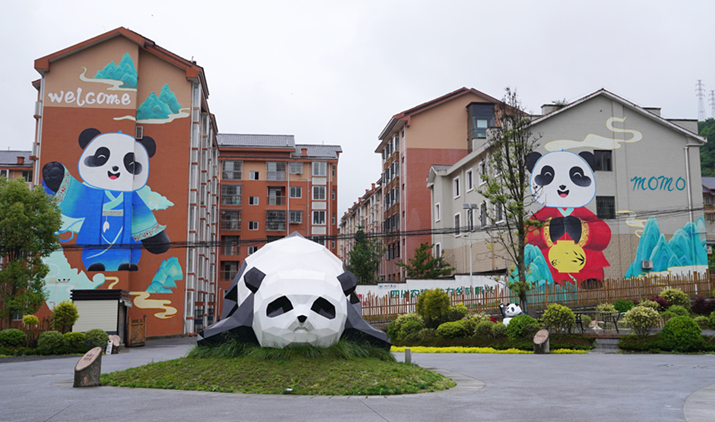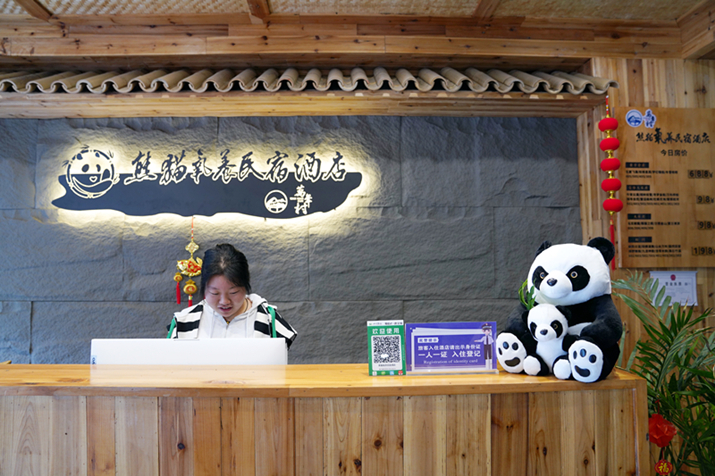|
||||||||||
| Home Nation World Business Opinion Lifestyle ChinAfrica Multimedia Columnists Documents Special Reports |
|
||||||||||
| Home Nation World Business Opinion Lifestyle ChinAfrica Multimedia Columnists Documents Special Reports |
| ChinAfrica |
| Star Effect |
| Pandas provide new forms of income for villages in southwest China |
| Reporting from Ya’an Ma Li 丨VOL. 15 June 2023 ·2023-05-30 |

A view of Wannian Village in Yingjing County, Ya’an, Sichuan Province, on 10 May
Dengchigou Catholic Church is located in the mountains of western part of Sichuan Province. The all-wooden structure in Baoxing County, Ya’an City, witnessed the first scientific discovery of the giant panda by French priest Armand David in 1869.
Today, it still plays a significant role in the history of the beloved bear, as a birthplace of the giant panda-related culture.
In recent years, Dengchigou Village, known as the discovery site of the giant panda, has explored a new tourism model. It combines sightseeing and ecological agriculture to create a sustainable way to enrich residents and revitalise the village.
Benefitting villagers
In January 2017, a project was launched to build a national park for the giant panda protection. The park included a large area of Dengchigou Village, and 39 families from the village moved to a new settlement called Panda New Village.
“In the past, our parents and grandparents lived in the conditions they were born in - using local resources to support their families. But today, we have returned the mountains to giant pandas,” Huang Tao, a 32-year-old resident, told ChinAfrica. Three years ago, Huang returned to the village and started a business after living and working in urban Ya’an City for years.
Moving out of the village meant the villagers lost their land-use right, but the giant panda became a new source of income for them, the local entrepreneur said, adding that his work in the city was rewarding, but he lacked a sense of belonging there.
In 2020, Baoxing County accelerated rural tourism development, and Huang seized the opportunity. With the help of the local government, he and another 32 villagers started operating homestays, fruit picking and other businesses.
Li Yunjun runs an agritainment business in Panda New Village. During the just-ended May Day holiday, his specialties such as traditional fermented meat were widely praised by tourists. The former truck driver used to support his family by transporting stone building materials. The agritainment business brings his family an annual income of 200,000 yuan ($28,480), at least twice that of the past.
“I had to travel to different places all the time. But now, I can earn money from home,” Li said, stressing he is thankful for the protection of giant pandas, which is what brings tourists to the village.
To improve the quality of tourism and consumption, the local government introduced a company focused on high-end homestay and health care, which is expected to help to enhance services in the new village with its advanced management philosophy.
“While achieving the high-quality development, we have also provided more jobs for young migrant workers who are willing to return to the village,” Li said. Despite the impact of the COVID-19 pandemic, the per-capita tourism income of people in the new village last year exceeded 18,000 yuan ($2,565). To create more possibilities for the village, Huang took the lead in planting 10 mu (0.67 hectares) of yam in the village and raised 100 miniature pigs.
“We hope visitors can also buy our special agricultural products to take back home,” he said.

A staff member works at the reception of a homestay in Wannian Village in Yingjing County, Ya’an, Sichuan Province, on 9 May
A green village
In Wannian Village in Yingjing County, Ya’an, at the south entrance of the Giant Panda National Park, people have opened hotels. The village is also famous for Momo Homeland, an exhibition of panda-themed sculptures and other items. Momo comes from The Classic of Mountains and Seas and is one of the ancient names for the giant panda.
Wang Yonggang, a commentator at the Giant Panda National Park, told ChinAfrica that they were building a homeland featuring Momo intellectual property based on the cultural basis of The Classic of Mountains and Seas.
Combining exhibitions, activity centres for young people and entertainment projects, it is hoped to provide more interesting and colourful choices to tourists who can spend at least two days in the village instead of a shorter stay.
Thanks to the promising cultural and tourism industry featuring giant pandas, the per-capita income of Wannian Village reached 19,000 yuan ($2,711) in 2022. Its collective income reached 640,000 yuan ($91,428), a year-on-year increase of 275 percent. This year, the villagers hope their collective income can exceed 1 million yuan ($142,800).
However, a decade ago, the situation in Wannian was difficult. “At that time, small coal mines were severely exploited, which resulted in serious pollution. The dumping of coal gangue seriously polluted the Jinghe River, and the water became unsuitable for drinking,” said Tao Yonghu, deputy secretary of the CPC Wannian Village Branch.
Resources including wood, stone and water were economic pillars of Yingjing County, especially Wannian Village. But the excessive logging, hydropower development and mining did great harm to the local ecological environment. Transformation became an urgent task, Tao, 56, said.
When Sichuan Province officially launched the pilot project of the national park in 2017, about 50 percent of Yingjing County was included.
“Hydropower stations, coal mines and timber factories were shut down, which means villagers lost their sources of income,” Tao said. But the decision also brought opportunities. “It forced us to change, and the change made our future brighter.”
In that year, Tao stopped mining and started to develop eco-friendly agriculture together with other villagers. They planted 500 mu (33.3 hectares) of square bamboo, becoming an important part of the square bamboo industry in the village.
According to a reward and subsidy plan, the village has earmarked more than 400,000 yuan ($57,040) to villagers participating in planting square bamboo in the past three years.
Recently, the village has planted over 3,100 mu (206.7 hectares) of square bamboo, involving 45 percent of the villagers. This year, they are working on a demonstration base of square bamboo, covering 500 mu (33 hectares).
“The square bamboo industry marks the first step of the transformation of Wannian Village, and we call it a giant panda-friendly industry,” Bi Han, first secretary of the CPC Wannian Village Branch, told ChinAfrica. “Backed by the national park, we rely on bamboo, just like giant pandas, to achieve common prosperity.”
Xie Qiang, director of the Eco-Environmental Protection Institute under the Sichuan Academy of Eco-Environmental Sciences, said, “After going through the painful transformation, these villages have explored a green road of development. They have integrated rural economic development with the construction of national parks, a practice and manifestation of ‘lucid waters and lush mountains are invaluable assets.’”
The two counties have built a good basis for the development of eco-tourism by promoting the culture of giant pandas, said Gao Fuhua, a senior reporter with Ya’an Daily with a profound insight into giant panda-related industries.
| About Us | Contact Us | Advertise with Us | Subscribe |
| Copyright Beijing Review All rights reserved 京ICP备08005356号-5 京公网安备110102005860号 |